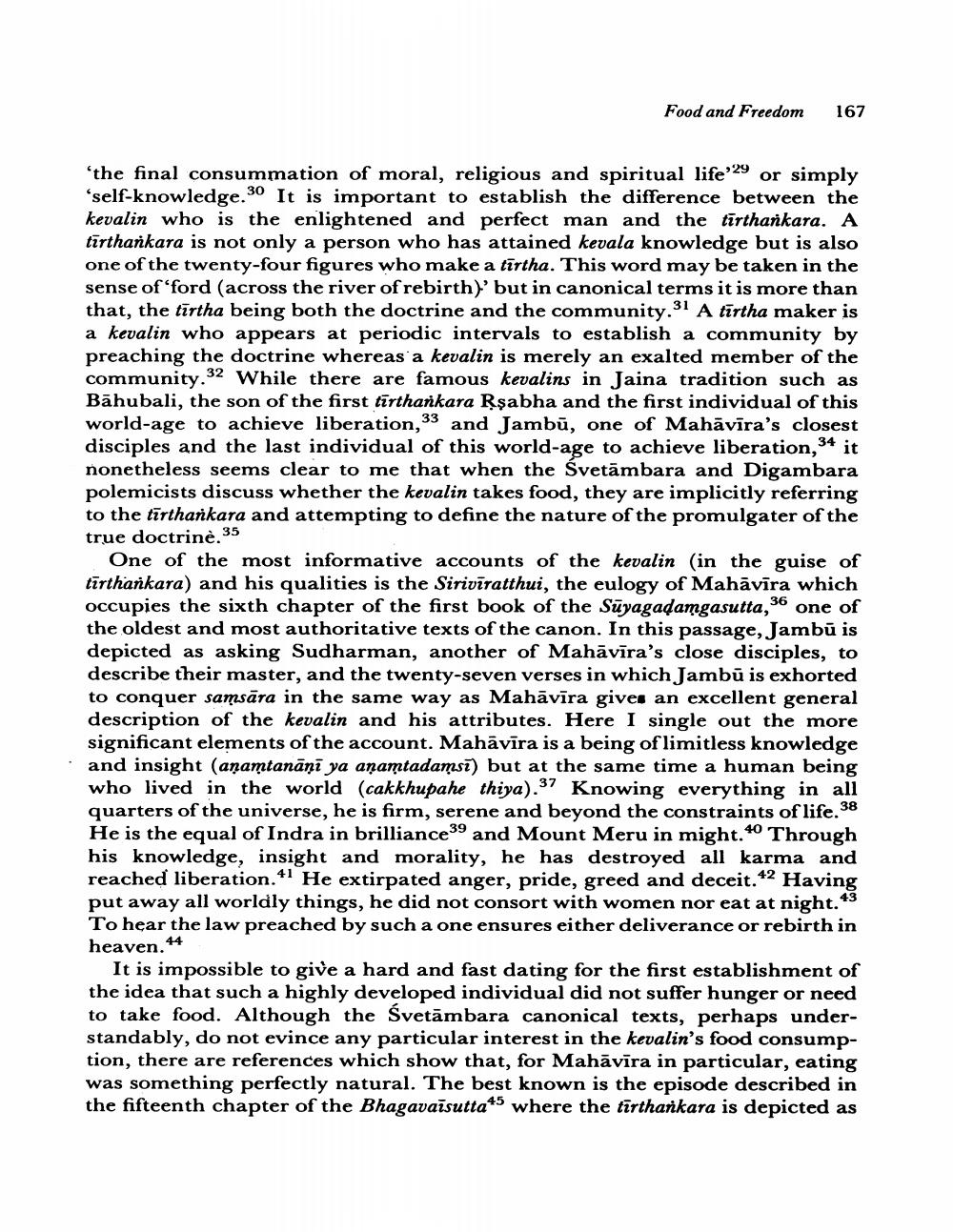Book Title: Food And Freedom Author(s): Paul Dundas Publisher: Paul Dundas View full book textPage 7
________________ Food and Freedom 167 'the final consummation of moral, religious and spiritual life 29 or simply ‘self-knowledge.30 It is important to establish the difference between the kevalin who is the enlightened and perfect man and the tīrtharkara. A tīrtharkara is not only a person who has attained kevala knowledge but is also one of the twenty-four figures who make a tīrtha. This word may be taken in the sense of 'ford (across the river of rebirth)' but in canonical terms it is more than that, the tīrtha being both the doctrine and the community. 31 A tirtha maker is a kevalin who appears at periodic intervals to establish a community by preaching the doctrine whereas a kevalin is merely an exalted member of the community.32 While there are famous kevalins in Jaina tradition such as Bāhubali, the son of the first tirthařkara Rşabha and the first individual of this world-age to achieve liberation,33 and Jambū, one of Mahāvīra's closest disciples and the last individual of this world-age to achieve liberation, 34 it nonetheless seems clear to me that when the Svetāmbara and Digambara polemicists discuss whether the kevalin takes food, they are implicitly referring to the tīrthankara and attempting to define the nature of the promulgater of the true doctrinè. 35 One of the most informative accounts of the kevalin (in the guise of tīrthankara) and his qualities is the Siriviratthui, the eulogy of Mahāvīra which occupies the sixth chapter of the first book of the Süyagadamgasutta, 36 one of the oldest and most authoritative texts of the canon. In this passage, Jambū is depicted as asking Sudharman, another of Mahāvīra's close disciples, to describe their master, and the twenty-seven verses in which Jambū is exhorted to conquer samsāra in the same way as Mahāvīra gives an excellent general description of the kevalin and his attributes. Here I single out the more significant elements of the account. Mahāvīra is a being of limitless knowledge and insight (anamtanāni ya anamtadamsi) but at the same time a human being who lived in the world (cakkhupahe thiya).37 Knowing everything in all quarters of the universe, he is firm, serene and beyond the constraints of life.38 He is the equal of Indra in brilliance 39 and Mount Meru in might. 40 Through his knowledge, insight and morality, he has destroyed all karma and reached liberation.41 He extirpated anger, pride, greed and deceit.42 Having put away all worldly things, he did not consort with women nor eat at night. 43 To hear the law preached by such a one ensures either deliverance or rebirth in heaven.44 It is impossible to give a hard and fast dating for the first establishment of the idea that such a highly developed individual did not suffer hunger or need to take food. Although the Svetāmbara canonical texts, perhaps understandably, do not evince any particular interest in the kevalin's food consumption, there are references which show that, for Mahāvīra in particular, eating was something perfectly natural. The best known is the episode described in the fifteenth chapter of the Bhagavaīsutta45 where the tīrtharkara is depicted asPage Navigation
1 ... 5 6 7 8 9 10 11 12 13 14 15 16 17 18 19 20 21 22 23 24 25 26 27 28 29 30 31 32 33 34 35 36 37
